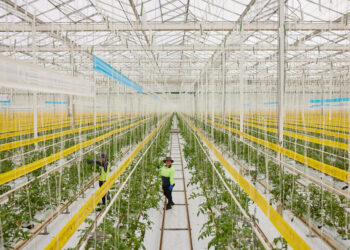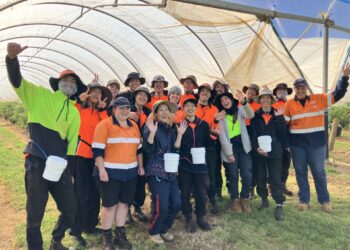Costa has established 10 Sustainable Commercial Farming Principles.
1. Water use and security
We will maintain a focus on reducing water inputs per unit of crop output through efficiency of water use and ensuring water security with a particular focus on water capture and recycling.
2. Climate change
We will continue to meet the challenges presented by climate change, using skills and technology to adapt to changing circumstances. This includes advancing the adoption and continued enhancement of protected cropping across our portfolio, finding new technological solutions and adopting the use of renewable energy sources where practical to do so.
3. Waste
We recognise that waste in all forms presents challenges with respect to its reduction. This requires a multi-faceted approach that includes adopting practices to reduce the impact on crop yield and quality loss, stringent post-harvest time-temperature management to extend product life cycles, active management of production waste, seeking ways to reduce packaging waste and removing or eliminating non and low value labour intensive activities.
4. Nutritional inputs
We will carefully select and apply crop nutritional elements and where practical endeavour to use organic and biological crop nutritional inputs. Care will also be taken to eliminate or reduce any migration of applied nutrients beyond our farm boundaries.
5. Biodiversity
Retaining a rich variety of plant life, native insects and soil microorganisms will enable us to continue our growing operations
successfully and effectively for many years to come. We will prioritise the application of organic and biological pest and disease
control methods on our crops where practical and cost efficient. Where chemical applications are required, these will be closely
monitored to measure ongoing efficacy of use and to ensure compliance.
6. Production yield
We will continue to develop and embrace agronomic technology and practices to increase crop yields for each hectare farmed, including production which occurs out of the soil. We will also seek to better understand the variables in crop production via the use of advanced measurements and analytical tools to obtain improvements in agronomic practices.
7. Productivity and efficiency
We will actively pursue investment that improves our productivity with a focus on the development of harvest and post-harvest
automation initiatives to ensure long-term cost efficiency and pricing competitiveness.
8. Workforce
The knowledge and application of our sustainable commercial farming practices is central to the development and training of our workforce. We also recognise they deserve a workplace that respects and recognises their basic human rights, is both safe and healthy, promotes diversity and provides opportunity for career advancement and training, while ensuring they are appropriately rewarded for their efforts.
9. Community
We will build and maintain an active involvement in supporting the social fabric of the many regional and rural communities in which we operate. Our footprint requires us to not only act and behave as a responsible corporate citizen, but to also work closely with communities so they can benefit both economically and socially from our ongoing presence.
10. Health and wellbeing
We only grow healthy and nutritious fresh food that is acknowledged as being essential to maintaining a healthy body and mind. We take great pride in the fact nothing artificial is added to our products after harvest and sold fresh just as they are.




